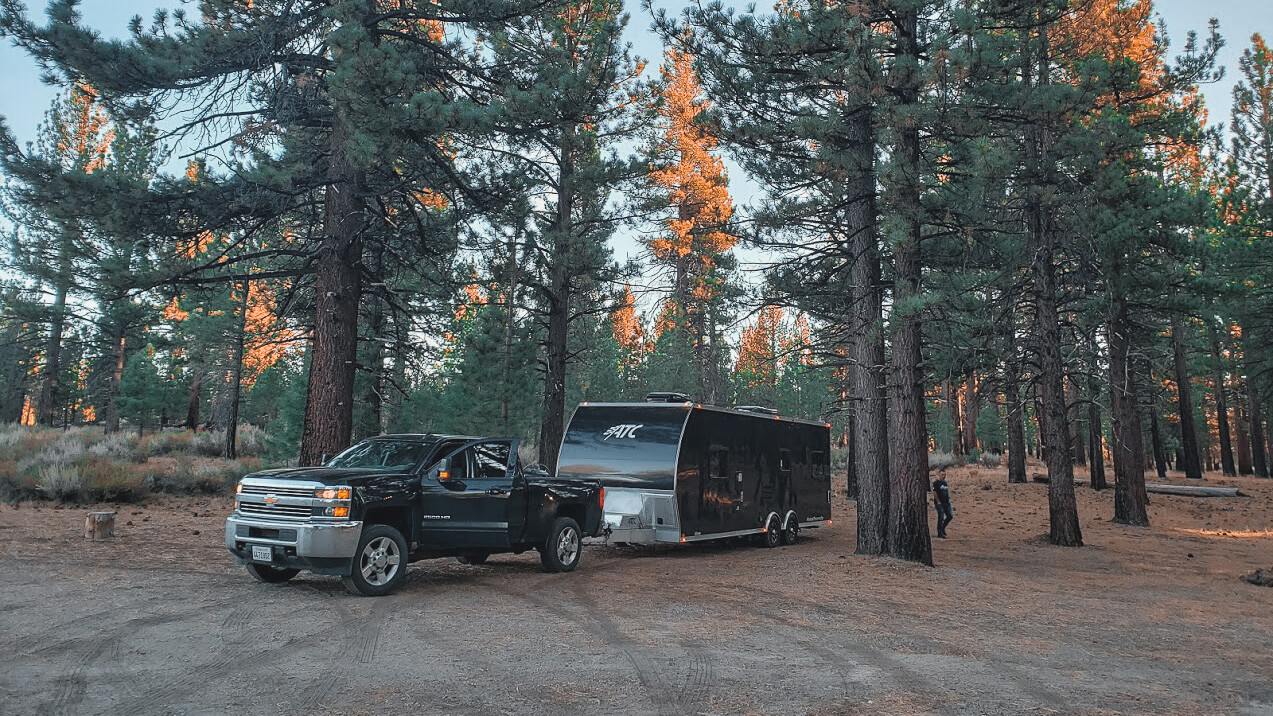As summer temperatures reach triple digits in the plains and valleys, you’ll want to set up camp in the mountains to find cooler weather. But camping in high altitude brings with it other challenges for RVers, van-dwellers, and car campers. We have assembled 10 tips for boondocking at high altitude…

10 Tips for Boondocking at High Altitude
These are based on our own experiences of boondocking over the years, as well as advice we’ve accumulated from others…
Altitude Sickness is a Real Thing
Once you get to 8,000 feet in elevation, you’ll notice yourself getting exhausted more easily. If you already have circulatory or respiratory issues, then give yourself more time setting up camp. Take more breaks. Also, keep the windows open in your RV or vehicle to let in more oxygen.
Some people are just more sensitive to altitude sickness. If you’ve not spent any significant amount of time at 8,000 feet or higher, it’s possible you will feel more dizzy, more nauseous, increased headaches, or just finding difficultly sleeping. These are symptoms that will go away on their own as your body learns to adjust. But if you already have circulatory or respiratory problems, your best solution is to find boondocking at lower elevations.
You Get Dehydrated More Quickly
This is largely because when the air gets more thin, your breathing increases. This causes your heart to beat more quickly, which in turn pushes more blood through your kidneys. And that… creates more urine.
It’s also because the air at high altitude is more dry. That dryness sucks the moisture out of your body.
Drink plenty of water.
Adjust the Carburetor On Your Generator
When you get above 5,000 feet in elevation, your generator may have trouble running, particularly under heavy loads. Most generators have some means to easily adjust the air-to-fuel ratio on their carburetors without having to take it apart.
Lighters May Have Trouble Lighting
If you rely on a butane lighter to start a campfire, you may find it won’t light anymore. 8,000 feet seems to be a magic number for a lot of things, and lighters are another one of them. Less oxygen in the air makes them more difficult to light. Wooden matches may be your better solution.
Propane Doesn’t Burn Well at High Altitude
This is because a flame needs both oxygen and fuel to burn. At high elevation, you have less oxygen.
Many high-end propane appliances come with a means to adjust for altitude, but most RV manufacturers don’t install these at the factory for cost reasons. There are, however, after-market companies that make high-altitude kits for cook-tops, furnaces, and refrigerators, but this can be a lot of effort to install.
The easiest solution is to bring alternative means for cooking, cooling, and heating, which may include a campfire grill, an ice chest, or plenty of warm clothing.
We’ve found that when boondocking at 8,000 feet to 9,000 feet, our propane appliances still worked fine. But that doesn’t mean yours will work too. Just be prepared, and experiment with how well your appliances work at various elevations.
Food Takes Longer to Cook Through Boiling
If you’re trying to cook pasta, you’ll notice that it takes longer to cook at high altitude. This is because water boils at lower temperatures, the higher up you go.
Whereas at sea level water boils at 212 degrees F, it now boils at 197 degrees F at 8,000 feet up. That cooler water temperature means its going to take longer for pasta to cook.
A general rule of thumb is to add one (1) extra minute of cooking for every 1,000 feet of elevation.
You Get Sunburned More Quickly
As the air gets more thin the higher up in altitude, the faster you can get sunburned. This is because the thinner air leaves less airborne particles to absorb the sun’s harmful rays. Just because the air temperature tends to be cooler up in the mountains, we don’t often think about excessive solar radiation.
Roads Get More Rocky and Bumpy the Higher You Go
Rivers and streams don’t become well-established until they reach lower elevation. That being said, when you’re higher up the mountain, water tends to flow everywhere, over roadways, trails, and campsites. That creates a lot of rocky, bumpy, and muddy driving.
Your vehicle may do just fine driving over that stuff, though it’s best to take caution. It’s always good to keep a tow-rope in your vehicle just in case you need help getting pulled out.
Read our other article, “Do I Need Four Wheel Drive for Boondocking?”
Firewood May Be Hard to Find at High Elevations
You may still find plenty of dead and down wood at 8,000 feet. But, if you decide to camp at 10,000 feet and higher, you may not find any firewood laying around. It’s best to bring your own wood with you.
The reasons why trees don’t grow at these extreme elevations is because the soil gets much more rocky. Rain and snow tends to wash nutrients down to lower areas. Extreme winds also make it more difficult for small trees to remain rooted down.
Read our other article, “Rules on Collecting Firewood for Camping“.
Get Yourself a Set of Climbing Harnesses
As a boondocker or camper you may not consider yourself a climber, but you will feel very compelled to do some hiking and climbing. When you’re 8,000 feet up and higher, most trails will only take you higher up, not down.
Having a set of ropes and harnesses will make a great addition to your pack. And now that you’re camped up in the mountains, this could be a great opportunity to try out some basic climbing.
This list of climbing kits has plenty more tips to find the right one for you.

